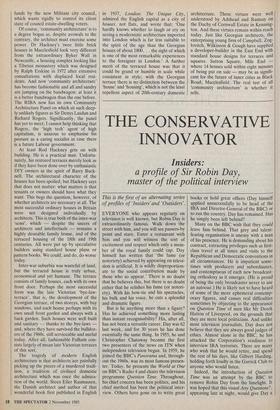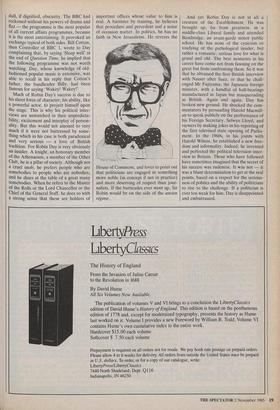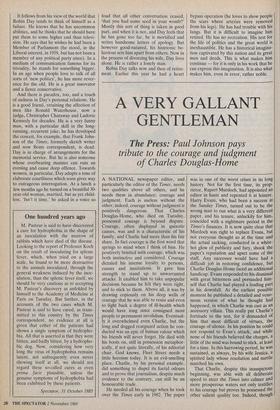THE CONSERVATIVE INNOVATOR
Insiders: a profile of Sir Robin Day, master of the political interview
This is the first of an alternating series of profiles of 'Insiders' and 'Outiiders'.
EVERYONE who appears regularly on television is well known, but Robin Day is extraordinarily famous. Walk down the street with him, and you will see passers-by point and stare. Enter a restaurant with him and you will witness the sort of excitement and respect which only a mem- ber of the royal family could cap. Day himself has written that 'the fame (or notoriety) achieved by appearing on televi- sion is artificial. It is wildly disproportion- ate to the social contribution made by those who so appear.' There is no doubt that he believes this, but there is no doubt either that he relishes his fame (or notori- ety). With his bow-tie and his spectacles, his bulk and his voice, he cuts a splendid and dramatic figure.
But is he anything more than a figure? Has he achieved something more lasting than instant recognisability? His, after all, has not been a versatile career. Day was 62 last week, and for 30 years he has done essentially the same thing. In 1955, he and Christopher Chataway became the first two presenters of the news on ITN when independent television began. In 1959, he joined the BBC's Panorama and, through- out the 1960s, was its most famous presen- ter. Today, he presents the World at One on BBC's Radio 4 and chairs the television programme Question Time. Throughout, his chief concern has been politics, and his chief method has been the political inter- view. Others have gone on to write great
books or hold great offices (Day himself applied unsuccessfully to be head of the IBA and Director-General of the BBC) or to run the country. Day has remained. Has he simply been left behind?
Many on the BBC wish that they could leave him behind. That grey and talent- fearing organisation is uneasy with a man of his presence. He is demanding about his contract, extracting privileges such as first- class travel at all times and visits to the Republican and Democratic conventions in all circumstances. He is impatient some- times with producers and subordinates, and contemptuous of each new broadcast- ing orthodoxy as it emerges. (He is proud of being the only broadcaster never to use an autocue.) He is likely not to have heard of some of the more ephemeral contemp- orary figures, and causes real difficulties sometimes by objecting to the appearance on Question Time of men like Mr Derek Hatton of Liverpool, on the grounds that they are mere local politicians. And unlike most television journalists, Day does not believe that they are always good judges of ethics. Almost alone in the BBC, he has attacked the Corporation's readiness to interview IRA terrorists. There are many who wish that he would retire, and spend the rest of his days, like Gilbert Harding, holding forth loudly in the Garrick Club to anyone who would listen.
Indeed, the introduction of Question Time was an attempt by the BBC to remove Robin Day from the limelight. It was hoped that this visual Any Questions?, appearing late at night, would give Day a dull, if dignified, obscurity. The BBC had reckoned without his powers of drama and fizz — the programme is the most popular of all current affairs programmes, because it is the most entertaining. It provoked an exchange typical of both sides. Bill Cotton, then Controller of BBC 1, wrote to Day complaining that, by saying 'Sleep well' at the end of Question Time, he implied that the following programme was not worth watching. Day, whose knowledge of old- fashioned popular music is extensive, was able to recall in his reply that Cotton's father, the bandleader Billy, had been famous for saying `Wakeyl Wakey!'
Much of Robin Day's success is due to his sheer force of character, his ability, like a powerful actor, to project himself upon the stage. This is why his political inter- views are unmatched in their unpredicta- bility, excitement and interplay of person- ality. But this would not amount to very much if it were not buttressed by some- thing which in his case is both paradoxical and very serious — a love of British tradition. For Robin Day is very obviously an insider. A knight, an honorary member of the Athenaeum, a member of the Other Club, he is a pillar of society. Although not a cruel snob, he prefers people who are somebodies to people who are nobodies, and he dines at the table of a great many somebodies. When he refers to the Master of the Rolls or the Lord Chancellor or the Chief of the General Staff, he does so with a strong sense that these are holders of
important offices whose value to him is real. A barrister by training, he believes that procedure and precedent and a sense of occasion matter. In politics, he has no faith in New Jerusalems. He reveres the
House of Commons, and loves to point out that politicians are engaged in something more noble (in concept if not in practice) and more deserving of respect than jour- nalists. If the barricades ever went up, Sir Robin would be on the side of the ancien regime.
And yet Robin Day is not at all a creature of the Establishment. He was brought up, far from greatness, in a middle-class Liberal family and attended Bembridge, an avant-garde minor public school. He has none of the cynicism or toadying of the pathological insider, but rather a romantic, serious love for what is grand and old. The best moments in his career have come not from fawning on the great but from confronting them. So it was that he obtained the first British interview with Nasser after Suez, or that he chall- enged Mr Fujiyama, the Japanese foreign minister, with a handful of ball-bearings manufactured in Japan but masquerading as British. Again and again, Day has broken new ground. He shocked the com- mentators by persuading Harold Macmill- an to speak publicly on the performance of his Foreign Secretary, Selwyn Lloyd, and viewers by making jokes in his reporting of the first televised state opening of Parlia- ment. In the 1960s, in his jousts with Harold Wilson, he established a new free- dom and informality. Indeed, he invented and perfected the political television inter- view in Britain. Those who have followed have sometimes imagined that the secret of his success was rudeness. It was not — it was a blunt determination to get at the real points, based on a respect for the serious- ness of politics and the ability of politicians to rise to the challenge. If a politician is ever too weak for him, Day is disappointed and embarrassed. It follows from his view of the world that Robin Day tends to think of himself as a failure. He knows that he has uncommon abilities, and he thinks that he should have put them to some higher end than televi- sion. He says that he wishes he had been a Member of Parliament (he stood, in the Liberal interest, in 1959, but has not been a member of any political party since). In a medium of communication famous for its triviality, he stands for something bigger. In an age when people love to talk of all sorts of 'new politics', he has more rever- ence for the old. He is a great innovator and a fierce conservative.
And there is paradox, too, and a touch of sadness in Day's personal relations. He is a good friend, retaining the affection of men like Ronald Waterhouse, now a judge, Christopher Chataway and Ludovic Kennedy for decades. He is a very funny man, with a particular skill in the long- running, recurrent joke; he has developed the conceit, for example, that Frank John- son of the Times, formerly sketch writer and now Bonn correspondent, is dead. Day is in charge of arrangements for the memorial service. But he is also someone whose overbearing manner can ruin an evening and cause deep offence. Towards women, in particular, Day adopts a tone of elaborate courtliness which soon gives way to outrageous interrogation. At a lunch a few months ago he turned on a beautiful 30- year-old woman, married, but as yet child- less. 'Isn't it time,' he asked in a voice so loud that all other conversation ceased, `that you had some seed in your womb?' Mostly this sort of thing is taken in good part, and when it is not, and Day feels that he has gone too far, he is mortified and writes handsome letters of apology. But however good-natured, his histrionic be- haviour sets him apart from others. Now in the process of divorcing his wife, Day lives alone. He is rather a lonely man.
Robin Day talks now and then of retire- ment. Earlier this year he had a heart bypass operation (he loves to show people the scars where arteries were removed from his legs). He has had trouble with his lungs. But it is difficult to imagine him retired. He has no recreation. His zest for the life of politics and the great world is inexhaustible. He has a historical imagina- tion captivated by this nation and its great men and deeds. This is what makes him continue — for it is only in his work that he can express this imagination. It is also what makes him, even in error, rather noble.
























































 Previous page
Previous page